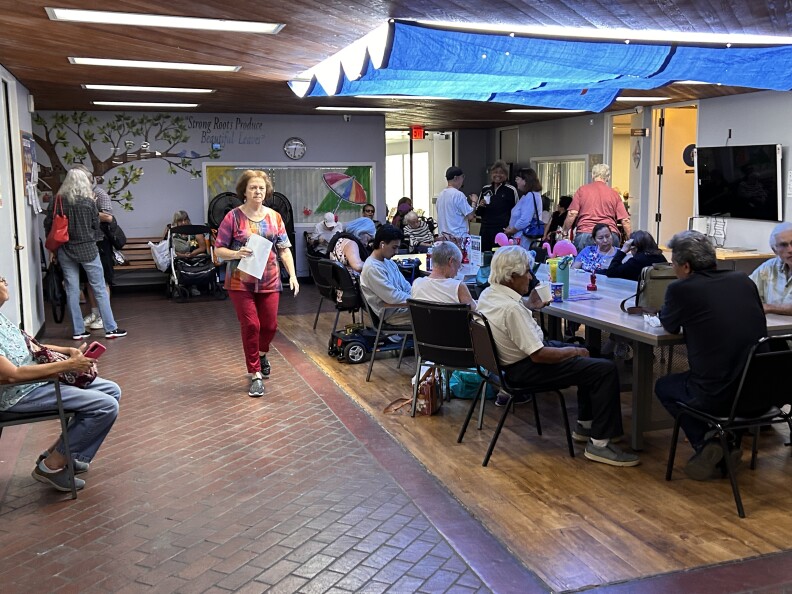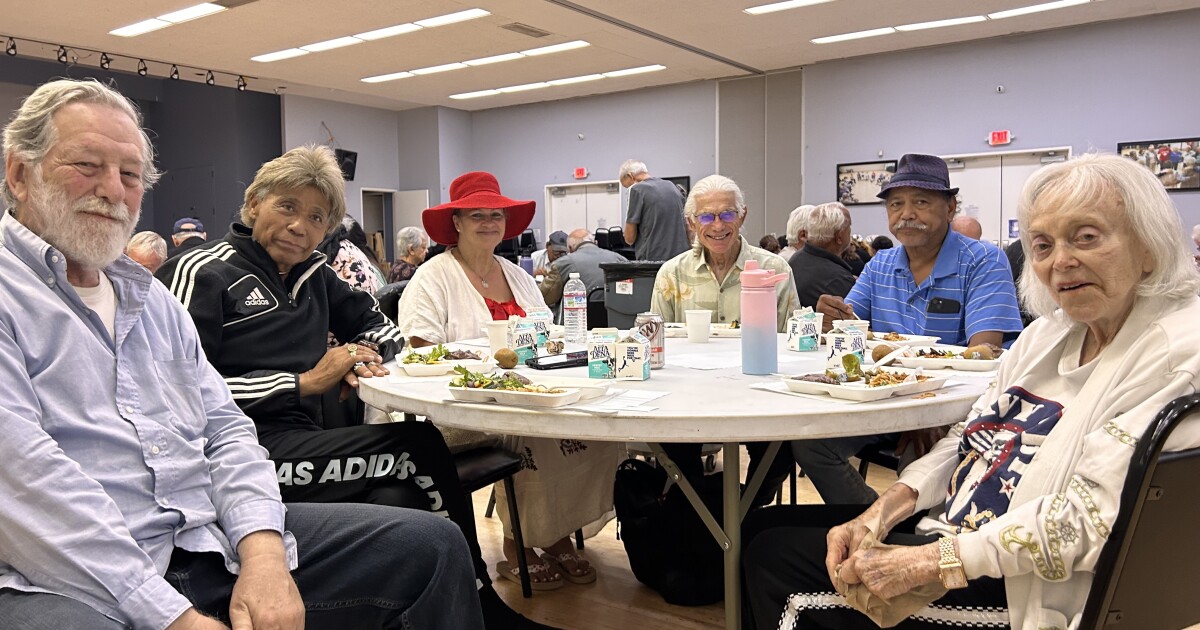Keep up with LAist.
If you’re enjoying this article, you’ll love our daily newsletter, The LA Report. Each weekday, catch up on the 5 most pressing stories to start your morning in 3 minutes or less.
The number of unhoused people living in and around Los Angeles is trending downward, local experts say, but that’s not the case for at least one group: older adults.
In the city of L.A., the number of people aged 65 and older experiencing homelessness jumped more than 17% since last year, and more than 36% in two years, according to annual point-in-time counts.
Among the unhoused, older adults are estimated to be the fastest-growing population in California, experts say.
Meanwhile, organizations that serve older adults are pulling back on services because of budget shortfalls while bracing for the effects of the Trump administration’s cuts to Medicaid. That means people are being turned away from free food programs, senior centers and other supportive resources.
And even before that, people who had housing were already struggling to keep it.
“They were having to choose between their medications, or keeping their lights on, or having food on the table, or paying their rent,” said Yvonne Sun of Special Service for Groups Silver, an L.A.-based nonprofit that provides resources to older adults in need by meeting them where they are.
A pandemic-era flush of funds from local, state and federal sources boosted the number of programs and services these organizations could offer, but that money has largely dried up.
Eli Veitzer, chief executive of Jewish Family Service L.A., said especially for older adults, ending up on the streets is a matter of “life or death.”
“The stakes couldn’t be higher,” Veitzer said.
What’s at risk
Many local organizations for older adults pay for the services they provide through grants and fundraising. But they also receive federal funding, particularly through the Older Americans Act, which was designed to boost community social services for older people.
They also get funding from the city and county of L.A.
At the height of the COVID-19 pandemic, the federal government funneled roughly $4.6 trillion to states and agencies to help people respond and recover, according to the U.S. Government Accountability Office.
That money allowed organizations like SSG Silver, Jewish Family Service and others to scale up. But it was temporary.
Now, leaders of those organizations say the services some older Angelenos rely on are at risk.

When older adults arrive at the ONEgeneration center, they sign in and select which activities they’d like to participate in.
(
Makenna Sievertson
/
LAist
)
On a recent Tuesday morning, about 100 people gathered at a senior center in Reseda, where they talked and laughed over trays of linguine, ground turkey and chocolate pudding.
Mark Schneider, 82, of Panorama City said having lunch at ONEgeneration’s center means he’s getting at least one good meal a day, rather than relying on what he could find at food banks.
It also helps stave off loneliness.
“ My whole life changed because in this community you get to meet people and they’re all friends, and you develop your ability to talk to people,” he told LAist. “I had lost that because I was alone.”
ONEgeneration runs seven sites throughout the San Fernando Valley. The Reseda location serves more than 6,000 people by offering meals, exercise classes, support groups and entertainment — including karaoke.
But as the organization struggles to fill funding gaps, some of those services might go away, according to CEO Jenna Hauss. Unless they can find alternative funding, she said they’ll likely have to decide by September to close one or two sites.
“The employees and volunteers that run them, they may no longer have a place to go,” Hauss told LAist.
Damien Valentino, 67, comes to the senior center every day, mainly to exercise and socialize, which he said supports his mental health.
(
Makenna Sievertson
/
LAist
)
Sandra Russell and Mark Schneider after their lunch.
(
Makenna Sievertson
/
LAist
)
The organization’s Homebound Meals program will be the hardest hit, she said. It delivers hot food to older adults, largely serving those with physical and cognitive impairments who live alone and can’t drive.
About 30% of the Homebound Meals program could be cut in the area, Hauss said, which means about 100 older adults will lose access to the free food “ with no other alternative resource to give them, simply because there’s nothing available.”
Hauss said the organization recently had to turn away a 101-year-old woman who was living by herself because the program isn’t accepting any new enrollments.
“We have to cancel people,” Hauss said. “It’s awful.”
Corrin Nagasaka told LAist the ONEgeneration program is essential. She declined to give her age to a reporter when interviewed for this story.
“You’re gonna say, ‘Oh, I don’t believe it,’” she quipped.
Nagasaka explained that the meal deliveries aren’t just about the food. They are an opportunity for connection — to have a conversation, even touch someone’s hand.
“And that’s sometimes all the contact they have the whole week,” she said.

Many people stick around after lunch to socialize into the afternoon.
(
Makenna Sievertson
/
LAist
)
What happened to the funding?
The “Big, Beautiful Bill,” signed by President Donald Trump on July 4, includes about $1 trillion in cuts to Medicaid over the next 10 years and nearly $300 billion from the Supplemental Nutrition Assistance Programs, otherwise known as SNAP.
Veitzer said cuts to Medicaid, called Medi-Cal in California, will have “a negatively powerful impact” on what services Jewish Family Service L.A. and others like it are able to provide.
For example, he said, the organization may have to make changes to its Assisted Living Waiver Program, which helps older adults get into assisted living, and its Multi-Purpose Senior Services Program, which helps older adults stay in their own homes.
Both programs serve hundreds of Angelenos, he said.
The city budget will also have a major impact, the organizations’ leaders say.
L.A.’s $13 billion budget, signed last month by Mayor Karen Bass, included “pretty severe” cuts for groups serving older adults, Veitzer said.
The city consolidated its Department of Aging with its Economic & Workforce Development Department and Youth Development Department. According to the mayor’s office, the move was designed to enhance services for older Angelenos, including those who may be at risk of homelessness.
But some service providers say they’re concerned that older adults — who make up nearly a quarter of L.A.’s population — will get lost in the system. The number of people 65 and older experiencing homelessness in the city went from 3,427 in 2023 to 4,680 in 2025, according to the point in time counts.
“We’re talking about a lot of subject matter expertise that is lost, and we’re also talking about representation and visibility,” Sun said.
In L.A. County, chronic homelessness among people 65 and older increased nearly 8.6% since last year, according to the point-in-time counts.
Measure A, passed by voters in November, raised the sales tax by a half a cent. The money is expected to be used for homelessness programs and housing efforts.
But less than 1% of funding is set aside for programs specifically for older adults in the county budget for homeless services for the current fiscal year. There’s $5 million listed for Permanent Housing for Older Adults out of the more than $637 million total budget.
“ It’s easier, and cheaper, to prevent the person from becoming homeless than it is to help them once they become homeless,” Veitzer said.
“For older adults … the consequences are more dire.”
